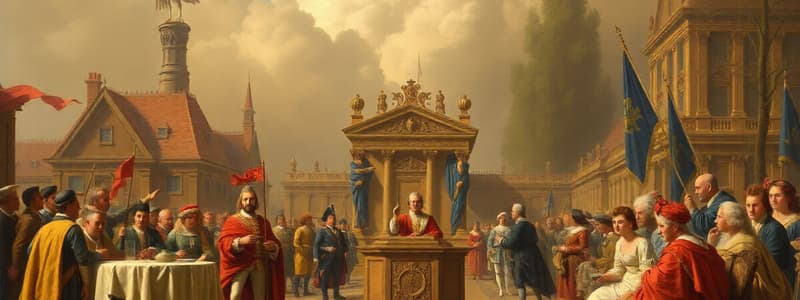Podcast
Questions and Answers
Which of the following best describes the composition of the Third Estate in pre-revolutionary France?
Which of the following best describes the composition of the Third Estate in pre-revolutionary France?
- Included only wealthy merchants and professionals.
- Primarily members of the clergy and religious figures.
- Consisted mainly of nobles and aristocratic landowners.
- Comprised the vast majority of the population, including peasants and commoners. (correct)
How did the Estates General contribute to the onset of the French Revolution?
How did the Estates General contribute to the onset of the French Revolution?
- By ensuring the nobility maintained their traditional privileges and tax exemptions.
- By providing a platform for the Third Estate to voice their grievances and demand reforms. (correct)
- By reinforcing the power and authority of King Louis XVI.
- By fairly resolving taxation issues and satisfying all three estates.
What was the main significance of the execution of King Louis XVI during the French Revolution?
What was the main significance of the execution of King Louis XVI during the French Revolution?
- It immediately restored peace and stability in France.
- It marked a turning point with the end of the monarchy and the rise of republican ideals. (correct)
- It had no significant impact on the course of the revolution.
- It led to stronger international alliances with other European monarchies.
Which of the following factors contributed to the French Revolution?
Which of the following factors contributed to the French Revolution?
What was the Reign of Terror, and which group was primarily responsible for it?
What was the Reign of Terror, and which group was primarily responsible for it?
How did pre-revolutionary living conditions contribute to the outbreak of the French Revolution?
How did pre-revolutionary living conditions contribute to the outbreak of the French Revolution?
What lasting impact did the French Revolution have on France?
What lasting impact did the French Revolution have on France?
Which event directly followed the French Revolution, significantly altering the political landscape of France?
Which event directly followed the French Revolution, significantly altering the political landscape of France?
Flashcards
Three Estates
Three Estates
The divisions of French society into clergy, nobility, and commoners.
Taille
Taille
A land tax in France that burdened the common people.
Estates General
Estates General
A representative assembly convened to address France's economic crisis in 1789.
Reign of Terror
Reign of Terror
Signup and view all the flashcards
Execution of King Louis XVI
Execution of King Louis XVI
Signup and view all the flashcards
Social Inequality Before Revolution
Social Inequality Before Revolution
Signup and view all the flashcards
Consequences of the Revolution
Consequences of the Revolution
Signup and view all the flashcards
Napoleon Bonaparte
Napoleon Bonaparte
Signup and view all the flashcards
Study Notes
The French Revolution: Causes, Events, and Consequences
- The French Revolution was a period of significant social and political change in France.
- French society was divided into three estates: the clergy (First Estate), the nobility (Second Estate), and the commoners (Third Estate).
- The Third Estate bore the brunt of taxation, while the First and Second Estates were largely exempt.
- Economic hardship, including poor harvests and rising bread prices, fueled discontent among the commoners.
- The Estates General, a representative body, was convened in 1789 to address the economic crisis.
- The Third Estate sought greater representation and demanded equality.
- King Louis XVI's attempt to regain power and the Reign of Terror led to severe consequences for those who opposed the revolution.
- The execution of King Louis XVI was a pivotal moment in the revolution.
- Pre-revolutionary France saw significant disparities between the estates, with privilege for nobility and clergy, and heavy financial burdens for the common people.
- The revolution led to the abolishment of the French monarchy and the rise of Napoleon Bonaparte.
- The principles of liberty, equality and fraternity became central to French identity.
- The French Revolution inspired social and political change globally.
Studying That Suits You
Use AI to generate personalized quizzes and flashcards to suit your learning preferences.
Related Documents
Description
Explore the French Revolution: its social and political changes, the estate system's inequalities, and the economic hardships that fueled discontent. Learn about the key events, including the convening of the Estates General and the execution of King Louis XVI. Understand the revolution's profound consequences on French society.




